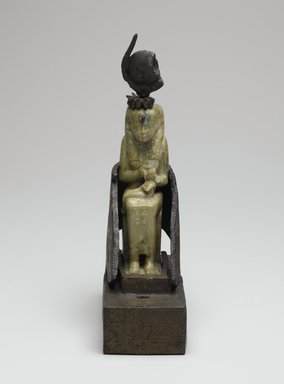
Artist:Egyptian
Medium: Egyptian alabaster (calcite), bronze
Geograhical Locations:
Dates:ca. 712–525 B.C.E.
Dimensions: 7 3/8 x 2 1/4 x 5 5/16 in. (18.7 x 5.7 x 13.5 cm)
Collections:
Museum Location: 19th Dynasty to Roman Period, Martha A. and Robert S. Rubin Gallery, 3rd Floor
Exhibitions:
Accession Number: 37.400Ea-c
Image: 37.400E_front_PS2.jpg,
Catalogue Description: Green calcite figure of Isis seated and nursing the infant Horus. The sides of the deity's throne are decorated with texts. The stone sculpture is connected to a bronze base by means of flanges on bronze base. The figure is "protected" in the rear and on both sides by a vulture body with wings which curve around towards the front. The wings were once inlaid with red and blue glass. The bird itself was made of two castings: wings and body, legs and tail. They were attached to the body by means of a tang fitting into a slot on the bronze base. Two more slots in the bronze base, located before the goddess, may have been for the attachment of a worshiping figure. The goddess is crowned, in bronze, with a circular frieze of uraei from which rise a cow's horns with solar disk. The sides of the bronze base bear inscriptions.